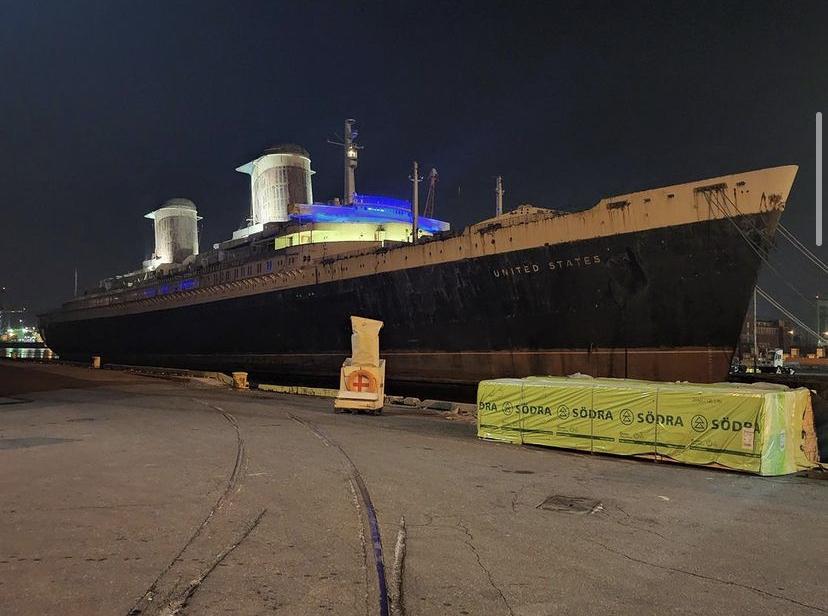On the evening of March 4, the colors blue and yellow were cast in light upon the massive superstructure of an ocean liner moored in Philadelphia Harbor.
The light illuminated the ship, bringing temporary life to the now abandoned bridge, where almost 50 years ago a proud captain and crew once stood as they piloted the massive ship across the Atlantic. But that night, as always the ship lay silent, sitting in the still harbor, just as it has done for decades.
The lights illuminating the ship represented Ukraine, and were projected as a symbol of solidarity for the war-torn nation. The ship, a symbol that once served as a symbol of America’s power and prestige now sits slowly rusting away at a lonely pier.
America’s power on the world stage is waning. Our ability to prevent large scale conflict and protect our allies has largely diminished in the past 10 years, as has our ability to diplomatically prevent conflicts.
This was seen over the summer with the loss of a US backed government in Afghanistan to the Taliban as the US brought a swift and tragic end to its longest war, and most recently with the nation’s inability to prevent war in Ukraine.
The Trump administration was the deathblow to America’s foreign policy, with actions such as abandoning of America’s Kurdish allies, threatening to withhold military aid from the Ukrainian government unless he received dirt on his political opponents and threatening to withdraw from NATO.
With that being said, America, just like her flagship, still remains afloat, and there is hope for salvage. While many may point to failures of the US military for these losses, it is in reality a result of a failure of the United States to utilize soft power, a nation’s ability to project power and influence through non-military means.
For most of the 19th century one of the greatest projections of soft power came in the form of ocean liners. Prior to World War II, nations like France, Britain, Germany and Italy each had their national liner, and all would vie for recognition as the fastest and grandest ship in the world.
Postwar in 1952 the United States launched their flagship, the S.S. United States. This ship would serve as a symbol for American excellence abroad and be a strong projection of the United States’ soft power.
The ship was exceptional for its time, becoming the fastest ever to cross the Atlantic, setting a speed record that is yet to be broken to this day. The ship embodied the essence of American excellence in itself and helped project American power abroad.
Not only in its engineering and power but in its cultural impact. Celebrities such as Bob Hope, Princess Grace of Monaco, Salvador Dali of Spain, Duke Ellington and even the Duke and Duchess of Windsor, as well as U.S. Presidents, Eisenhower, Truman, Kennedy and even a young Bill Clinton sailed aboard the United States.
Just as America’s power abroad came under fire with the height of Vietnam in 1969, so then did the S.S. United States ended its service with the ushering in of the Jet Age. The Ship, like the country she represents still remains afloat, but lacks the power and prestige it once had.
Now, just as there is a group who believes our flagship can be saved, The S.S. United States Conservancy was formed with the daunting task of raising millions of dollars to save the ship from scrap, I know there are people out there who believe our nation can be saved as well.
The revival of America’s influence and power abroad cannot come at the end of the barrel of a gun, but rather through the spread of culture, money and ideas. Yes, some theorists may point to the idea that American culture and economic influence can be felt worldwide, after all you can see the golden arches in almost every nation on Earth, but I don’t think a Big Mac is enough to prevent world wars.
We need to become leaders for good. We need to become leaders on climate change, show the world that we are a haven for the tired and poor, innovate for the sake of humanity, not just to send billionaires on a rocket ride.
Most of all, we need to back our allies, not only militarily, but with economic aid and trade. And when Putin is defeated, and he will be defeated, let’s take a page out of our past, and provide the funds needed to rebuild Ukraine, just as we did for Western Europe after the end of World War II.
America’s reputation abroad can be saved, and when it is, we will be a safer world. To do this we need to recommit to the use of soft power.









